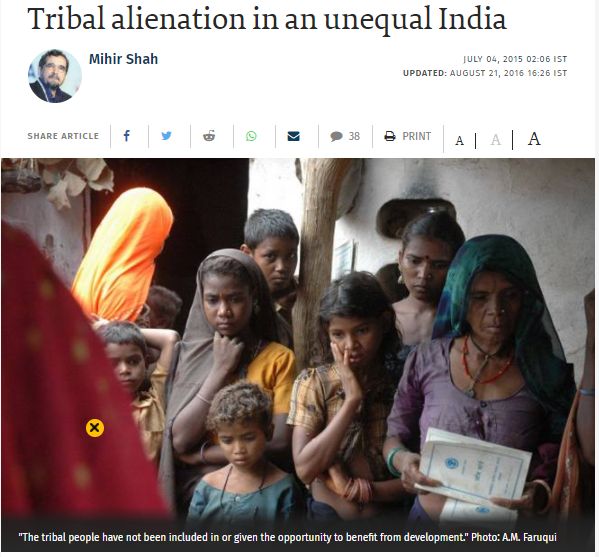“Why I am not a Hindu: A Sudra Critique of Hindutva Philosophy, Culture, and Political Economy” is a book written by Kancha Ilaiah Shepherd.

In the book, the author examines the socio-economic, and cultural differences of the castes existing in India. He argues that, Hinduism has never been a humane philosophy and shares his experiences of being a Hindu from the lower caste.
In the book, he takes the stand that people from the so called lower castes have never been a part of the Hindu religion. He explicates the difference between the Hindus and the Dalitbahujans on the basis of their culture, family life, marriage, education, market relation, power relation, God and Goddesses, and death.
Author starts the book with a rejection of being bulge Dalitbahujans in with Hindus “The question is What do we, the lower Sudras and Ati-Sudras (whom I also call Dalitbahujans), have to do with Hinduism or with Hindutva itself ?”.
The author’s wrath towards the oppression of the Dalitbahujans by the so called upper castes is clearly felt throughout the writing. In the introduction, he urges “My request to Brahmin, Baniya and Neo-Kshatriya intellectuals is this: For about three thousand years you people learnt only how to teach and what to teach others—the Dalitbahujans. Now in your own interest and in the interest of this great country you must learn to listen and to read what we have to say. A people who refuse to listen to new questions and learn new answers will perish and not prosper”.
In the book, author expressed his surprise to find that despite being Dalitbahujans were treated as non Hindus for thousand of years, suddenly Dalitbahujan become equal to Brahmins, Baniyas, and Neo Kshatriyas. However, the equality is just by name. Now definitely Dalitbahujans are under the category of Hindus, but are not supposed to have that equal rights like Hindus. Where even the shadow of Dalits were treated as an omen, suddenly people started making them a part of Hindu culture.
This apparent feeling of giving equality came at the time of conflict against the Muslims and Christians. Dalits are declared a part of Hinduism just to display majoritarian Hindu presence. Question is, why the Dalits would affirm this declaration? Author says that he knows something about Muslims (Turukoollu), Christians (Kirastaanapoollu), Brahmins (Baapanoollu). And among all of them he finds at least some aspects of life that were common among Dalitbahujans, Muslim and Christians. The food they eat were common. They were allowed to touch each other and even they celebrated the festival Peerila together. In all of that, he doesn’t find any connection with Brahmins and Baniyas. And now he is told that both the different castes have same culture and religion!
I felt anguished towards the ideologies of Illahia’s tecahers. When I read the line, “Our school teacher’s attitude to each one of us depend on his own caste.” He continues, “Our home have one culture and the school have another culture.” This made me question, What is the ideology and worldviews of the teachers? What is the teachers expecting from the next generation? What kind of future and social order the teachers were envisioning before them?
Illahia also attacks the framing or writing of the textbooks. He writes, “We had an English textbook that talked about Milton’s Paradise Lost or Paradise Regained, or Shakespeare’s Othello or Macbeth or Wordsworth’s poetry about nature in England, or a Telugu textbook which talked about Kalidasa’s Meghasandesham, Bommera Potanna’s Bhagavatam, or Nannaya and Tikkana’s Mahabharatham except the fact that one textbook is written with twenty-six letters and the other in fifty-six letter?”

The alienation, the author has felt with these texts is quite evident. As the content is not presenting the experiences of the learners and their own experience is outcaste too. The others never tried to know their lives and culture. Thus, Dalitbahujans never found any connection with the textbooks as they never found their lives being reflected in the story books. The equality which has been a topic of great discussion in the recent times is not going to come by showmanship of washing the feet of the untouchables or eating with them. It will come from the fundamental changes in the human beliefs. In the book, Iliah has shown how caste discrimination is prevailing in the society. There is hardly any answer in support of Why caste discrimination still prevails in the society ? And what benefits it has given us so far?
While reading the book, I felt that Prof. Kancha Ilaiah presented his arguments citing his personal as well as collective experiences. I am compelled to think and question myself “Who is a Hindu?” and “Am I a Hindu? ”
Kancha Ilaiah Shepherd (2019). Why I am not a Hindu: A Sudra critique of Hindutva philosophy, culture and political economy. New Delhi: SAGE Publications India.
